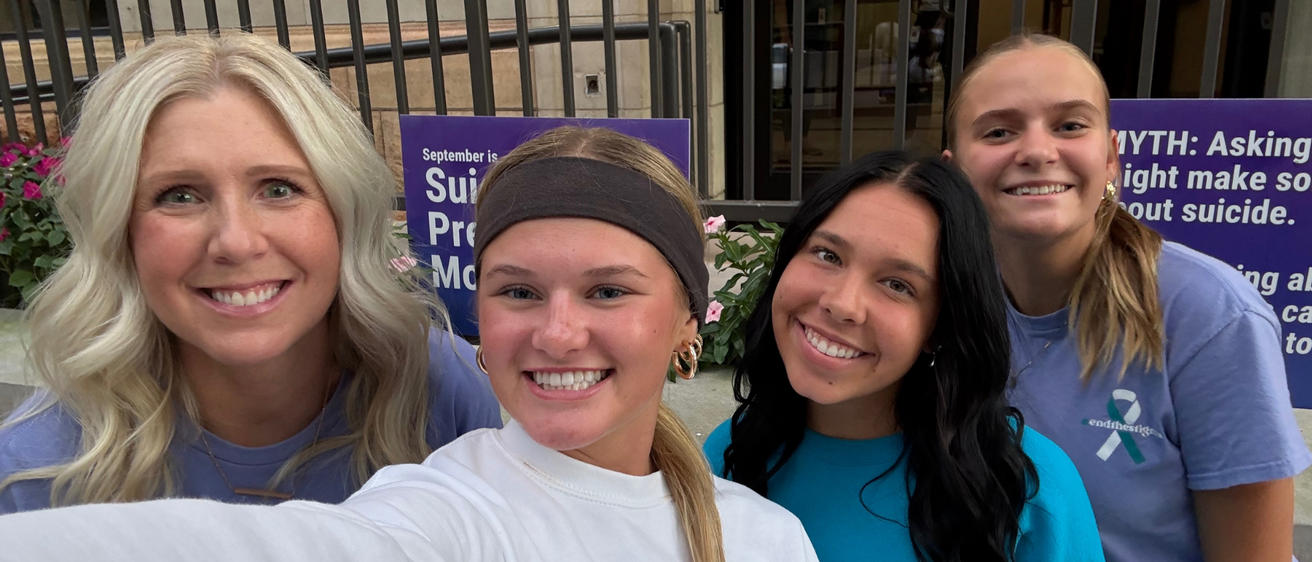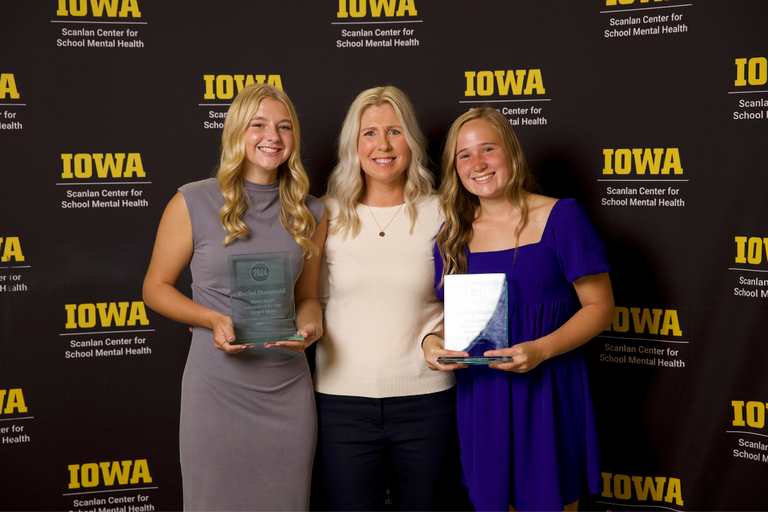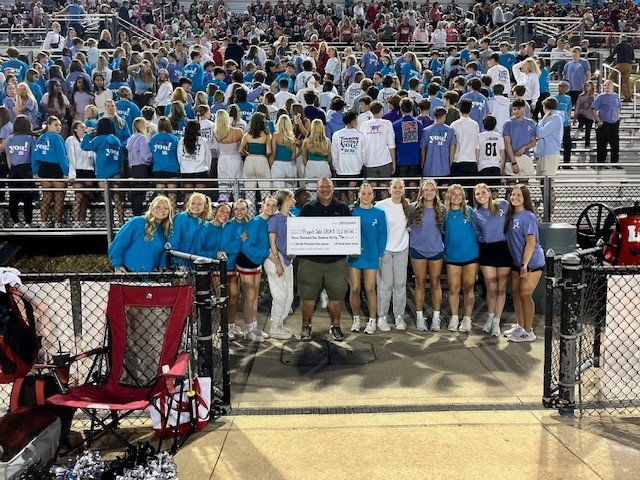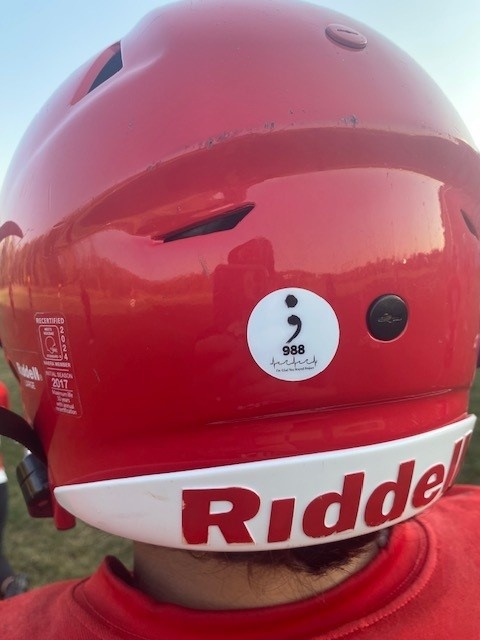For students at Linn-Mar Community High School (Marion, IA), Jessica Deahl is more than a Student Assistance Counselor—she’s a lifeline. Throughout five years in her role, Jessica has earned the deep trust of her students, evidenced by the increasing number of counseling referrals she receives each year. However, her work extends far beyond one-on-one support. She empowers students to lead, advocate, and create change, making Jessica a deserving honoree of the October 2025 Iowa School Mental Health Hero of the Month award.
Jessica is the driving force behind Mental Health Matters, a student-led club that has flourished under her leadership, growing from 37 members in 2021 to more than 125 in 2025. Together, they’ve launched schoolwide initiatives that have shifted the culture at Linn-Mar Community High School. From placing the 988 crisis number on every student parking tag to hosting high-profile athletic events like the annual Mental Health Matters football game, Spike Out the Stigma, and Mind Over Miles, the group has raised thousands for local mental health organizations while normalizing conversations about mental well-being. With over 800 volunteer hours logged and statewide recognition earned, Mental Health Matters has become one of Iowa’s most active and impactful student-led groups. Additionally, Jessica leads the Signs of Suicide (SOS) program, which integrates within the 7th- 9th-grade curriculum and offers depression screenings for students.
“Jessica is a major source of inspiration for school-based mental health,” said Kevin McCauley, a fellow Linn-Mar student assistance counselor. “She has provided hope for so many students and truly saved lives. There is no one more passionate about this work.”
Linn-Mar’s principal, Dr. Jeff Gustason, echoed that sentiment: “Jessica has guided our students to take a positive yet serious approach to mental health. Her relentless efforts to expand prevention programs and screenings have helped countless students access the support they need.”
Jessica’s commitment to student well-being is shaped by her nearly ten years of working in juvenile justice and more than 14 years in K–12 education, including nearly a decade at Oak Ridge Middle School (Marion, IA) before transitioning to Linn-Mar Community High School. Jessica received her BA in Psychology from Central College and a master’s in school counseling from the University of Northern Iowa.
Her career has been marked by a relentless devotion to helping students navigate both academic challenges and personal hardships. Jessica's passion for mental health advocacy is deeply personal. She knows the weight of the unspoken “what ifs” and has committed her work to ensuring no student feels invisible.
“Thanks to Mrs. Deahl, mental health is no longer something people feel they have to hide,” said MacLynn Hannan, Linn-Mar Community High School Class of 2025. “She has made it normal to talk about it and helps every student feel safe and supported.”
As a counselor, Jessica blends academic, career, and emotional guidance to create spaces where students can rediscover their self-worth. Above all, she lives by a simple yet profound belief: everyone carries something, and with the right support, students can thrive.
“I just want to help students when they're in any kind of pain,” Jessica said. “Everybody deals with something on some level, and that’s why this work matters so much to me.”
Read about Jessica’s insights and tips in the Q&A below.
You are the staff sponsor for the Mental Health Matters student club at Linn-Mar High School. How do students get involved? What are your future goals for this group?
The Mental Health Matters club began with kids communicating with one another to invite their friends. We continually promote ourselves, and students reach out to make connections. For example, we have an activity fair at the beginning of every school year for the 9th-grade students, where they can sign up to participate.
Last year, we had approximately 113 students in Mental Health Matters, and we anticipate having close to 150 when the pledge forms are submitted this year. The pledge form states that they'll use sensitive language when discussing mental health and be a good role model. We also have their parents sign the pledge because we want them to know what their child is working on and what they are participating in.
My goals are really their goals. I try to guide the group with two core principles: first, whatever we do should be something they believe will help them and their peers—not just what I think will work. And second, it must be sustainable and easily transitioned to the next senior leadership team. It’s about building long-term impact, not just one-time moments.
The club’s big launch was a Suicide Prevention Awareness Night at the varsity football game on September 29, 2023. For the event, the club created “Tomorrow Needs You” t-shirts with the 988 crisis number on them, donated a portion of the proceeds to the I’m Glad You Stayed Project, organized mental health resources at the game, and even involved both football teams with helmet stickers as well as the cheerleaders, poms, and band.
To learn more about the football game that started it all and student leaders Rachel Dunnwald and Sydney Fischer, who helped lead this effort, watch this video:
Since then, students haven’t slowed down. They’re now building events into every season—fall, winter, and spring—so the momentum keeps going year-round. Last spring, during Mental Health Awareness Month, they said, “Let’s make sure students know what resources are out there before summer hits.” That idea sparked a track meet dedicated to mental health, complete with “Mind Over Miles” warm-up shirts for every athlete. As well as, green “Mental Health” jerseys for the boys’ and girls’ soccer team during a game in May. Those are the kinds of initiatives we want to continue building on, turning them into traditions, so they become an integral part of our school culture.
Right now, students are brainstorming a winter initiative that will feel meaningful during what can be a particularly challenging time of year for many students. And they’re also thinking bigger: not just building something meaningful for Linn-Mar but helping spread the message across the wider community.
Could you explain the Signs of Suicide (SOS) program and talk about the impact on students and the school community?
The SOS (Signs of Suicide) program is a really important part of our mental health work at Linn-Mar. We’ve been using it for almost 10 years. It’s an evidence-based, research-supported program, backed by the Substance Abuse and Mental Health Services Administration (SAMHSA), and we use it in both middle and high school. One of the biggest strengths of SOS is that it gives us a common language, something we can use consistently across grades and buildings.
The core of SOS is a simple but powerful message: Acknowledge. Care. Tell.
Acknowledge that your friend is hurting.
Care—let them know you care and that they’re not alone.
Tell a trusted adult if you’re worried, they need more help.
That language becomes something students can actually use. It's not vague or overwhelming. They start to internalize it and understand what to do if a friend is struggling, or even if they are.
We deliver SOS through a 45–50-minute classroom lesson, and target grades 7, 8, and 9 for direct instruction every year. The lesson covers the signs of depression and suicide, how to seek help, how to break down stigma, and how to support others. It’s age-appropriate but very real. We also talk about identifying a trusted adult, both inside and outside of school, because we want students to picture what getting help would actually look like.
In addition to the classroom lesson, we also offer a brief depression screening; however, this part requires active parental consent, as mandated by current legislation. We offer this opportunity to families of students in grades 7 through 12.
The screening itself is designed to identify students who may need extra support. It includes questions around depressive symptoms and includes two suicide-specific items. If a student provides certain responses, we interview them immediately. We sit down with them, talk through what they shared, and try to understand the full picture. Then, we contact parents, walk them through what we’ve learned, and work together to determine the best next steps. That might mean counseling, connecting with an outside provider, or building on existing supports.
Is there a specific success story or moment that made you feel like your work truly made a difference?
Without a doubt, the moment I knew our work was making a real impact was when the Mental Health Matters shirts took off. Getting the 988 number out in front of people on these t-shirts was huge. You never really know what you’re preventing—what might not happen—because someone had that number and reached out. Hearing later from students who actually called 988 and were connected to help makes every bit of the work worthwhile.
I truly don’t go a single day in the main building without seeing someone, whether it’s a custodian, a student, or a teacher, wearing one of the shirts. And even beyond school, I hear from parents and students who say, “I wore my shirt today, and people loved it.”
That kind of response is powerful. Because it’s not just about wearing a shirt. It means they’ve embraced the message. They’re proud to be connected to it. It has become a part of who they are, a part of their daily life. That’s when I knew that I had really listened to the students, that I helped bring their vision to life in a way that was authentic and meaningful to them.
And I felt proud, not just of myself as a facilitator, but of everyone who had to say yes to make it happen. From the athletic department to administrators to district leadership, I never doubted their support. That’s something I’ve always been confident in about Linn-Mar. But to see it all come together? That first football game, and every one since? That was a moment.
What makes it even more special is the way the shirts have layers of meaning now. Every year is a different color, and now, when you look around, you can tell who’s been part of it since year one, who joined in the second year, and soon, we’ll see the third-year shirts added to the mix. It’s like a visual timeline of the movement growing.
And I genuinely believe that students who have graduated have taken those shirts with them to college. It’s a part of their story now. That’s the kind of ripple effect you can’t fully measure, but you feel it. That moment, the first shirt, the first game, and everything it sparked, was truly transformative. It meant so many things to so many people. And for me, it’s the clearest sign that what we’re doing matters.
What is 1 practice, big or small, that any K-12 educator could start tomorrow, and that would make their classroom or school a supportive space for students’ mental well-being?
Honestly, something as simple as greeting students at the door can make a huge difference. It might not seem like much, but it sets the tone for the entire day. When you’re genuine—saying, “I’m glad you’re here” and really meaning it—that moment of connection shows students they’re seen.
It also gives you a chance to read how they’re doing. Are they quieter than usual? Do they seem off? That quick check-in can be the first step in noticing when something is wrong. And in a building as large as ours, with over 2,200 students, those daily interactions are crucial.
As counselors, we rely heavily on teachers because they’re with students every day. We have six school counselors, three student assistance team members, and two academic assistance counselors, but we can’t be everywhere. When teachers take time to build relationships and know students beyond academics, it creates a ripple effect throughout the school.
Even something small, like pulling a student aside and asking, “Hey, you seem a little different today—everything okay?” can open a door. Those little actions build trust and safety in a classroom. And that’s something any educator, anywhere, could start tomorrow: be present, be genuine, and be intentional in showing students they matter.



